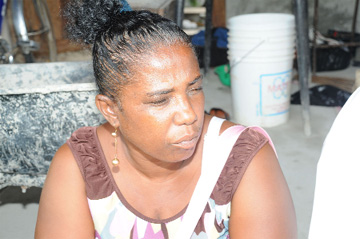There is a toughness in the countenance of Jean Singh that sends a message of a street smart, self-willed individual whose livelihood is fashioned out of tough, honest endeavour. Jean is a vendor, a veteran vendor,
A few days ago Stabroek Business spoke with Jean about the business of vending, the challenges of the trade and the difficult decisions that must sometimes be made if survival is to be assured.
We met her on the site of the Water Street Mall where, along with several others vendors, she was engaging a team from the Georgetown City Council that had come to the site to oversee the ongoing construction exercise.

Some years ago she brought her business from the street to the Arcade. ”I moved to Parika after business became tough and left the stall to my daughter.” She told Stabroek Business. Her daughter moved too and she lost her original ‘spot’ on the arcade.
The new development, however, has brought Jean back to Water Street where she has been allocated another position. And while she is not unmindful of this fresh opportunity that the Water street facility offers Jean is not yet in the building stage. When we asked her why she said she was “looking to see what was going on on the ground.”
In this business, Jean told us, you have to make decisions with caution. She points out the vendors are not people “with money to throw away.”
Jean speaks from the perspective of sound and sobering experience. She belongs to that generation of vendors who started on the streets – “outside Guyana Stores and Fogarty’s and opposite the present arcade,” she says. The price of this risky pursuit was the constant scrutiny of the City Police. The Arcade, when it opened, was “a sort of testing place.”
Vendors are a special breed of hardy humans for whom nothing is certain. “The conditions change every day and sometimes you sell nothing,” Jean says.
As high rise bonds and multi-storey malls appear in the commercial centres Jean fears for the future of vending. She says that the high street merchants are gradually pushing the vendors out of business. Jean explains that what the major traders enjoy is the fact that they import almost everything. “We have to sell whatever they import. The prices at which their goods come to us is only a little less than their retail prices. We cannot sell for what they sell for and they know this. All of us know that we are being forced out”.
In response to this, Jean says, vendors must engage in “these price wars” with wholesalers. She says that some of the bigger vendors have managed to “get around that” by “dealing with some distributors.”
Jedan’s approach has been different. She understands that if she can break the wholesaler monopoly, “even in a small way, she stands a much better chance of taking advantage of the market. “What I have decided to do is to specialize in school ‘things,’ books and clothing. I travel to Trinidad, Suriname and as far as the United States. The advantage of travelling is that you get a chance to select your own goods. The problem is that everyone is selling the same stuff. When you travel you bring different things and you can offer things that nobody else can.”
Jean says that she is not bothered by the fact that while the established traders enjoy the support of the institutions like the Georgetown Chamber of Commerce and the Private Sector Commission, vendors are pretty much on their own. “We are used to the hustle. We are accustomed to the hassle that comes with the hustle. That is our way of life and we have to live with it. What we care about is that we want to be seen as real business people.”





